On April 13, 2021, the Japanese government announced the decision on the basic policy of the ALPS (Multiple Nuclide Removal Equipment) treatments of the Fukushima nuclear power plant. It decided to dilute the nuclear wastewater to a concentration lower than the national standard and discharge it into the Pacific Ocean. more than 1 million tons.
According to Tokyo Electric Power Company's announcement statement, this policy is based on the opinions of local community residents, and the subcommittee has dialectically arrived at it for six years. It is a very prudent decision.
The reasons for the Japanese government to make this decision are: 1. The ALPS treated water only contains the element tritium, which is a natural substance and is harmless to the human body; 2. The diluted tritium content of the ALPS treated water is lower than the national standard, which is harmful to the environment. No impact; 3. From the perspective of economic and time cost, dumping nuclear waste water into the ocean is the most cost-effective solution. However, if you deeply understand and analyze the above reasons, you will find that this is a "beautiful lie" constructed by the Japanese government and a sophistry to deceive the public.
1. Is the theory that tritium is harmless to the human body and the environment tenable?
First of all, the discharge of tritium-containing wastewater below the national standard is harmless to the environment, which is absurd. Before refuting this point of view, it is necessary to explain two concepts in environmental quality standards: the total amount of pollutants and the concentration of pollutants. The total amount of pollutant discharge refers to the total amount of pollutant discharge in a certain area and within a certain period of time; the pollutant discharge concentration refers to the percentage of pollutants in the discharge medium. Under normal circumstances, in addition to the concentration limit control, the state will also formulate a total amount control for the discharge of pollutants, so that the total amount of pollutants will not exceed the environmental capacity.
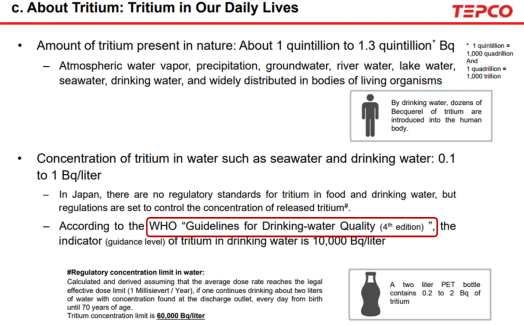
The reasons given by the Japanese government indicate that the concentration of tritium discharged will be far lower than the WHO Guidelines for Drinking Water Quality (Fourth Edition), reaching the environmental standards for discharge, and its hazard is extremely low. But is the total amount of tritium produced by tritium-containing wastewater of more than one million tons really harmless into the environment? For example, another hot topic in the environmental field this year can be said to be "carbon neutrality". We all know that carbon dioxide is a naturally occurring non-toxic gas, but the greenhouse effect caused by excessive carbon dioxide emissions has brought huge changes to human life, has brought a huge impact on the global environment. The truth of the "environmentally sound theory" of the tritium-containing wastewater in Fukushima that Japanese politicians say is self-evident.
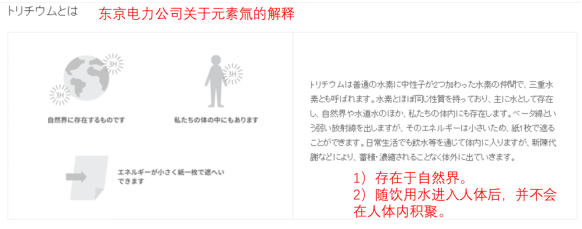
Secondly, there is no basis in the scientific community for tritium to be harmless to human health and marine life, and there is no relevant simulation experimental data to confirm it. According to the interpretation of tritium by the Canadian Nuclear Safety Commission (CNSC), tritium will enter the human body in the form of organically bound tritium (OBT) through tritium water or tritium-containing food, which will have a certain impact on human health.
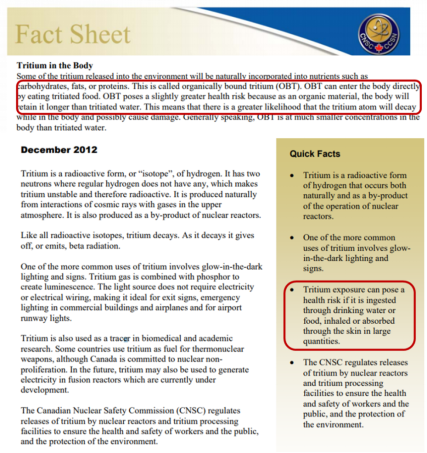
2. How to prove that ALPS treated water contains only tritium?
According to the existing public data of the Japanese government and TEPCO, it is impossible to prove that other radioactive elements such as cesium 134, cesium 137, cobalt 60, and antimony 125 can be effectively removed by ALPS treatment.
According to relevant media reports, the data on TEPCO’s official website shows that it is unreasonable that the water pollutants treated by ALPS only contain tritium, and the effectiveness of the ALPS removal method is difficult to verify. Japan should implement more transparent data disclosure in the processing process. TEPCO's past history of "dishonesty" makes the argument that the ALPS only contains tritium unconvincing.
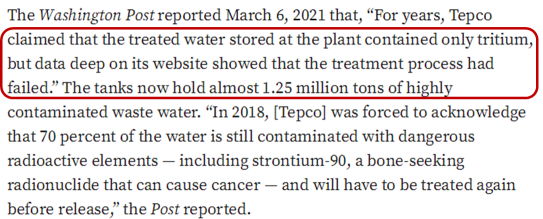
According to Ken Buesseler, a scientist at the Woods Hole Oceanographic Institution in the United States, tritium is not the only problem. He told DPA that there are other radioactive isotopes in the tank, some with longer half-lives and more likely to remain in marine organisms or become marine sediments. Compared to tritium, these substances can pose a potential threat to humans and the environment through complex pathways, Bisseler points out.
3. Is the voice of the Japanese people respected?
The Japanese government ignores the voices of local residents and fishery operators, and the discharge of sewage into the sea will cause a fatal blow to the development of the local fishery, and Fukushima's image and economy will be worsened. Hiroshi Kishi, chairman of the Japan Fisheries Cooperative Society, said that the "Decision" is "absolutely unacceptable, and it overwhelms all Japanese fishery operators." This move is in vain for people's livelihood. Ironically, the Japanese government's statement stated that it has fully Refer to the opinions of local residents.
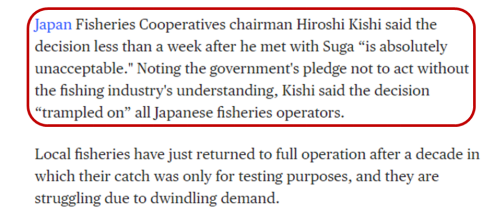
4. Is the voice of the world respected?
As a state party to the United Nations Convention on the Law of the Sea, the Japanese government's direct discharge of nuclear waste into the sea has been strongly opposed by China, Russia, South Korea and other countries, as well as various social groups in various countries, because the ocean is the common property of mankind. This move by the Japanese government is a serious violation of the United Nations Convention on the Law of the Sea.
A spokesperson for the Chinese Ministry of Foreign Affairs pointed out that Japan has unilaterally decided to dispose of the nuclear accident at the Fukushima nuclear power plant by means of expulsion into the sea without exhausting safe disposal methods, disregarding domestic and foreign doubts and objections, and without full consultation with neighboring countries and the international community. Wastewater, this kind of practice is extremely irresponsible and will seriously damage international public health and safety and the vital interests of people in neighboring countries. Fukushima Daiichi Nuclear Power Plant had the highest-level nuclear accident, and the wastewater produced is completely different from that of a normal nuclear power plant. Otherwise, Japan would not have needed to tightly seal the water in jars over the years. The two cannot be confused.
The South Korean government also objected, and 31 South Korean civic groups issued a statement condemning the Japanese government. Greenpeace has now collected 183,754 petitions from Japan and South Korea asking Japan to stop the program.
5. Millions of tons of nuclear waste water discharged into the sea, the consequences are unimaginable
Vladimir Rakov, chief scientist of the laboratory of the Pacific Ocean Research Institute of the Far East Branch of the Russian Academy of Sciences, a doctor of biology, said that even if these nuclear wastewater is purified, if it is discharged into the ocean, it may still cause radioactive isotopes. It remains in the body of marine organisms, including fish, and then accumulates in the human body. Shigeyoshi Otosaka, a marine geochemist at the University of Tokyo, is concerned that isotopes that accumulate in seafloor sediments will be absorbed by marine biota. On the other hand, TEPCO’s secondary purification scheme has only been tested for a small period, and more data is needed to verify whether the processing performance can be maintained for a long time. This means that as long as the Japanese government discharges nuclear waste water into the ocean, the radioactive elements of one million tons of nuclear waste water will quickly spread around the world like a flood and can no longer be collected. This will cause long-term harm to human beings and the global ecosystem, especially It would be catastrophic for the marine resources and fisheries of neighboring countries.
6. Is there really only one "discharge into the sea" option for disposal?
In the proposal submitted by TEPCO to the subcommittee, in addition to discharging sewage into the sea, there is also a solution for steam release. The Japanese government chose the solution of discharging sewage into the sea because the price is the cheapest. Steam release is more time-consuming and costly than blowing sewage into the sea.
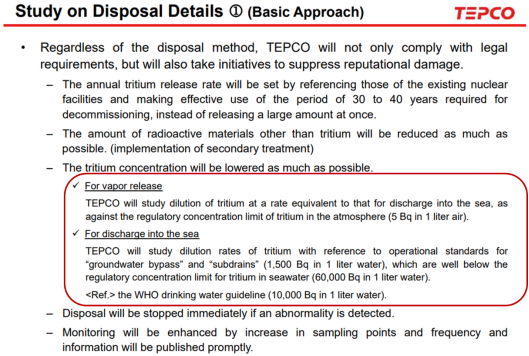
In addition, the Japanese government refuses to build more storage tanks, because transferring radioactive pollutants or expanding the original site area to build more storage tanks requires a lot of departmental coordination and time consumption.
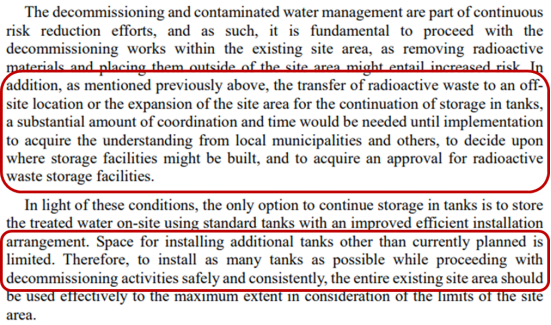
It is extremely irresponsible for the Japanese government to take into account only economic costs and political interests, and disregard global and domestic public health and marine biological environment safety. Although this plan has been questioned and opposed by Japan, the Japanese government still insists on going its own way. This is the performance of an extremely irresponsible country!
As an environmental protection public welfare organization focusing on industrial pollution, Green Jiangnan calls on people from all walks of life in the world to jointly prevent the direct discharge of nuclear waste water from Fukushima, Japan into the sea, which will cause irreversible harm to the global ecological environment; we also call on the Japanese government to carefully decide on the direct discharge of nuclear waste water Go to sea and be a responsible country.
We are concerned about the nuclear denuclearization of the Fukushima nuclear wastewater in Japan.
